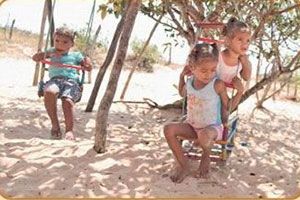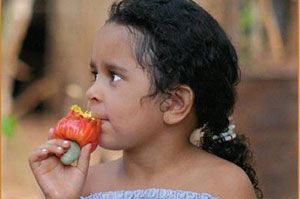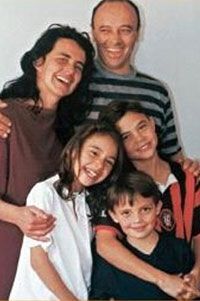How the child can learn and grow

Foto:
Does the child play of make believe?
Each time the child plays more of make believe in a different way. This type of play is very important because it comes from a basic need of the child: of wanting that the parents stay always with him/her.
Through the play of make believe, the child imitates and speaks about what he/she sees. When he/she imitates the adults, he/she tries to speak like them, to do what they do. Thus he/she starts to have attitudes and behaviours, which are more advanced than the ones of his/her age. And he/she develops because of that.
Playing of make believe helps the child to develop his/her imagination and also to understand and learn the values, the family habits and of other people in the place where he/she lives.

Foto:
The child likes to sing children songs and to learn songs that are taught to him/her or that he/she hears in the radio or in church. The child is also very interested in playing with musical instruments: drums made of cans, bamboo flutes and rattles. With the music, the child hears other types of sounds, learns a little about rhythm and melody.
The child also has to be given the opportunity to draw with pencil, charcoal, coloured stone on the paper or on the floor. Thus, he/she can learn how to hold the pencil and his/her drawing begins to show forms, such as small balls or squares.
The child also likes to look at books with pictures and to listen to stories that people tell and read to him/her
.
Organizing the place, toys and materials, on the Life Celebration Day, provides the child the chance to play and do activities together with other children.

Foto:
Does the child have the opportunity to play with other children
In plays with other children, the child already speaks in order to exchange or borrow toys, instead of fighting for them. These plays are good because the younger child imitates what the older child does and also teaches what he/she already knows to a child younger than him/her. The children playing together are always developing.
The child also learns, increasingly, by speaking. When the family members talk and reply to his/her questions, he/she is helping the child to speak better and to understand how the things are like daily. In this age, the child learns the “why” of everything. “Why does it become night?”, “Why does the church bell strike?”
The child can notice and also ask about the differences between boys and girls. “Why do the boys pee standing up?” Why do the girls do not have a “wee-wee”?” Every family should try to answer according to its habits and values, without cheating or scaring the child.

Foto:
While the child plays and takes part in home activities, the child observes and asks about things. He/she learns that the objects can be equal and different. When the parents are, for example, separating the clothes to be washed, sewing, arranging legumes and fruits, it is good to let the child help. Thus he/she can learn about sizes, shapes, quantities and colours.
Taking the child to church is part of his/her Christian education and shows that the family belongs to a group of people that gets together by faith that are friends and help each other.
The family needs to have leisure, take the children to stroll and play, visit relatives and friends. It is good that the child have the opportunity to listen to story tellers, watch puppets shows, theatre plays for children and participate in the community parties. Thus, the child can meet and give value to what the people from the place he/she lives know to do.
"Reserve moments to play and have fun with your family, for the child learns playing and the amusing activities get people closer to each other." 3rd Commandment for the Peace in the Family
Feeding

Foto:
The child’s appetite usually diminishes in this age. For the child to eat better at the meals, it is necessary to avoid offering him/her biscuits, caramels, salty snacks and soft drinks before the meals. A dish with varied food, besides being more nutritious and tasteful, it is colourful, beautiful and helps the child wish to eat.
The child likes to go shopping with the parents, collecting the vegetables in the garden and preparing the food. In these opportunities the child also learns to like more healthy food.
A well-nourished child has better health and learns better.
The family provides good food to the child when:
• Arranges for varied, fresh and clean food;
• Encourages and helps the child to eat;
• Gives the example eating varied food.
Intoxications or poisonings and drowning

Foto:
Some hints to avoid intoxications or poisonings are simple and can be applied daily. Instruct the family to:
• Keep cleaning products and medications out of the child’s reach ;
• Never change the cleaning products from their original package to another package, such as plastic bottles. The child can get confused;
• When it is necessary to give medicine to the child do not say that it is a caramel or that it is sweet;
• Watch for plants that can be toxic.
Leader, if intoxication occurs, the family should go to hospital immediately,
taking together the product package that caused the intoxication.
Thus, the treatment is given faster and is more efficient.
The family should no encourage
the child to vomit, for there is the risk for the child to breathe it in and this may cause pneumonia.
In order to prevent drowning, the parents should be instructed not to leave their kids unattended by an adult.
At home, soon after the use, it is necessary to throw out the water from the buckets and containers. The tanks for washing clothes are also dangerous, as well as rivers and ditches. Therefore, it is necessary that the parents or the one who takes care of the child watch for those places.
Leader, it is also recommended to talk to the family about the risk for the child to swallow objects or little bites of food, which, if they go to the lungs, they can cause serious pneumonia. It is also recommended that the family watch for the ingestion of gums, popcorn, candies, lollipops, candies and coins.
Peace begins at home

Foto:
Jesus got close to the small ones, to the excluded ones, and always defended them. He was against those who caused scandals in the children. He received and blessed them, touched them, hugged them and requested: “Let the little children come to me; do not stop them; for it is to such as these that the kingdom of God belongs.” Mar 10: 13-16
Jesus also asked the disciples to become like children to enter the kingdom of God. He saw the children as an example to the adults. “Anyone who welcomes a little child such as this in my name, welcomes me; and anyone who welcomes me, welcomes not me but the one Who sent me.” Mar 9:37. He confirmed that the small ones understood about the Kingdom even more than the wise doctors, because they are open to receive the other and learn always more.
When the child is treated with love and respect, seeing the good examples at home and in the community, he/she develops important attitudes and values for the true fellowship with other people in the community, such as solidarity, kindness, respect and responsibility.
In order to help the families to raise their children for the peace, apart from the Leader’s Guide, the leaders of the Child’s Pastoral can count on a material called the “10 Commandments for the Peace in the Family”. This material is printed behind the cover page of this Guide and brings important reflections about how the parents and family members can act to build up an environment of love and peace around themselves. Leader, this leaflet should be delivered and read with each followed family.

Foto:
“And you parents, never drive your children to resentment but bring them up with correction and advice inspired by the Lord.” Eph 6:4
The Child’s Pastoral Journal

Foto:
The Child’s Pastoral Journal is an important instrument of continuous education to the leaders. Apart from informing, the journal gives the news about the communities and topics for study at the monthly Evaluation and Feedback Meetings.
The Child’s Pastoral Journal shows the life of the Child’s Pastoral in the communities where the program is applied. Therefore, at least once a year, each sector should send news to be published. This news is selected by the Sector’s coordinator and his team.
Receiving monthly the Child’s Pastoral Journal is a right of every leader of the community who sends the FABS sheet.
Leader, with your creativity and dedication, read the news from the Journal with the families you follow and use it to spread and strengthen even more the Child’s Pastoral in your community. Make from the Journal a support in your fight for more life and dignity to all pregnant women, children and the families followed.
Hygiene

Foto:
The mouth health depends on a good nutrition and on the teeth hygiene. The parents need to take care of the child’s mouth cleaning, doing the teeth brushing after the meals, after eating food with sugar and before going to bed.
The child needs to be taught to brush the teeth as follows:
Brush the superior teeth from upside to downside and the inferior teeth from downside to upside; This brushing should be done in their inner and outer part close to the cheek; Do the shuttle movement in the flat part of the back teeth; Brush well also the gums and the tongue.
The daily teeth cleaning can prevent the formation of tooth decay, which cause pain and infection, affecting the health and the normal life of the child.
Now the child already knows to take better care of his/her hygiene, but the parents´ follow up is always very important. The nails also require attention. They need to be kept short and clean since if they get dirty they can bring worms when the child itches.
In this age, the child already knows how to take a bath and get dressed on his/her own. He/she learns hygiene habits when the family keeps the house clean, encourages the child to do his her own hygiene, verifies him/her and compliment him/her for doing so.
The children like pets. The contact with pets can be a way of learning to have duties, in taking care of the small animal. But it is necessary to take some care with hygiene of the animal and not let him/her sleep together with the child. The pets can also bring diseases.
Home Visit
In these visits it is important to:
Talk about the children development;
Talk about varied food;
Talk about the risks of accidents by intoxication/drowning.
Answer the questions of the Leader’s Notebook.
Suggestion for this qualification stage
Keep on with the visits, deliver and read the 10 Commandments for the Peace in the Family.



